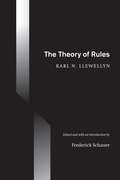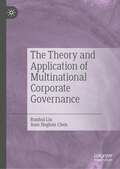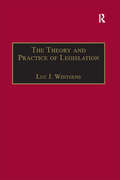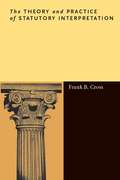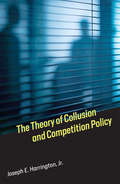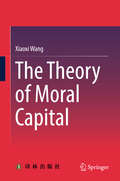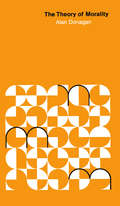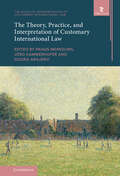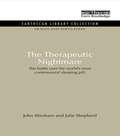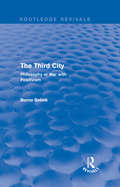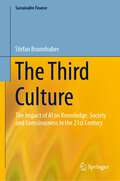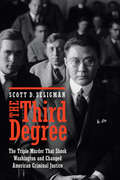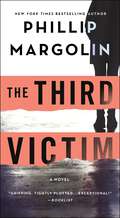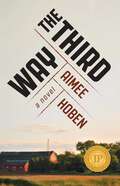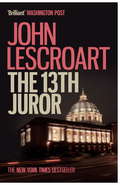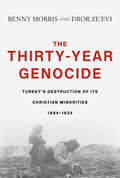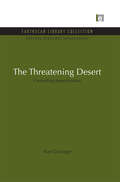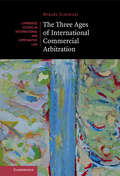- Table View
- List View
The Theory Of Rules
by Frederick Schauer Karl N. LlewellynKarl N. Llewellyn was one of the founders and major figures of legal realism, and his many keen insights have a central place in American law and legal understanding. Key to Llewellyn’s thinking was his conception of rules, put forward in his numerous writings and most famously in his often mischaracterized declaration that they are “pretty playthings.” Previously unpublished, The Theory of Rules is the most cogent presentation of his profound and insightful thinking about the life of rules. This book frames the development of Llewellyn’s thinking and describes the difference between what rules literally prescribe and what is actually done, with the gap explained by a complex array of practices, conventions, professional skills, and idiosyncrasies, most of which are devoted to achieving a law’s larger purpose rather than merely following the letter of a particular rule. Edited, annotated, and with an extensive analytic introduction by leading contemporary legal scholar Frederick Schauer, this rediscovered work contains material not found elsewhere in Llewellyn’s writings and will prove a valuable contribution to the existing literature on legal realism.
The Theory and Application of Multinational Corporate Governance
by Jean Jinghan Chen Runhui LinMultinational enterprises have become a main engine of the global economy, technical advancement, and product innovation, playing a pivotal role in the world economy and the global technological revolution. However, MNEs are also often embroiled in financial fraud and corporate scandal which show that MNEs should improve their corporate governance. Meanwhile, as COVID- 19 runs rampant across the world, populism and deglobalisation have resurged, and protectionism and unilateralism are exerting negative impacts on the world economy. Achieving sustainable development in this context is a test of a company’s management and governance abilities. How should they be governed? This book will be a useful tool for university research-led teaching and fundamental research in corporate governance theories of MNEs in general, as well as using Chinese case studies as evidence to support our theoretical arguments.
The Theory and Practice of Legislation: Essays in Legisprudence (Applied Legal Philosophy)
by Luc J. WintgensThis work provides a rational framework for legislation. The unifying premise behind the essays is that, although legislation and regulation are the result of a political process, legislation and regulation can be the object of theoretical study. The volume focuses on problems that are common to most European legal systems and the approach involves applying to legislative problems the tools of legal theory - hence 'legisprudence'. Whereas traditional legal theory deals predominantly with the application of law by the judge, legisprudence enlarges the field of study so as to include the creation of law by the legislator. The original essays published in this collection expose and develop a range of new insights into the relationship between legislative problems and legal theory in a way which will engage and interest legal scholars throughout the world.
The Theory and Practice of Statutory Interpretation
by Frank B. CrossWhile issues of constitutional interpretation are often occasions of great public controversy, Cross (law, U. of Texas) argues that the interpretation of statutes is of far greater practical consequence. It this volume he reviews the theoretical arguments and empirical evidence relevant to the efforts by legal scholars to construct a systematic structure for statutory interpretation. He first presents the "delegation construct," wherein judicial authority to interpret statutes must be considered as derived from Congressional intent, even as frequent ambiguity with regard to Congressional intent is admitted. He then analyzes the leading methods and theories of statutory interpretation--textualism, legislative intent, interpretive canons, and pragmatism--particularly assessing them against the problem of willful and outcome-oriented judging. Next, he examines the practices of the Supreme Court in some 100 cases decided during the Rehnquist Court, finding pluralism in the interpretive approaches applied to cases and assessing the impact of ideological bias. Finally, he assesses the practices of lower courts, finding that textualism and pragmatism has boomed. He also finds that textualism tended to lead to negative citations that distinguished or declined to apply Supreme Court holdings, thus casting some doubt on the clarity and value of textualist interpretive methods. Annotation ©2009 Book News, Inc. , Portland, OR (booknews. com)
The Theory of Collusion and Competition Policy
by Joseph E. HarringtonA review of the theoretical research on unlawful collusion, focusing on the impact and optimal design of competition law and enforcement. Collusion occurs when firms in a market coordinate their behavior for the purpose of producing a supracompetitive outcome. The literature on the theory of collusion is deep and broad but most of that work does not take account of the possible illegality of collusion. Recently, there has been a growing body of research that explicitly focuses on collusion that runs afoul of competition law and thereby makes firms potentially liable for penalties. This book, by an expert on the subject, reviews the theoretical research on unlawful collusion, with a focus on two issues: the impact of competition law and enforcement on whether, how long, and how much firms collude; and the optimal design of competition law and enforcement.The book begins by discussing general issues that arise when models of collusion take into account competition law and enforcement. It goes on to consider game-theoretic models that encompass the probability of detection and penalties incurred when convicted, and examines how these policy instruments affect the frequency of cartels, cartel duration, cartel participation, and collusive prices. The book then considers the design of competition law and enforcement, examining such topics as the formula for penalties and leniency programs. The book concludes with suggested future lines of inquiry into illegal collusion.
The Theory of Moral Capital
by Xiaoxi WangThis book captures the quintessence of the author’s 20-year career, presenting both unique perspectives and logical arguments. Guided by the Marxist concept of historical materialism, it reveals the function and effect of morality by analyzing and defining the moral domain. Further, it argues that economic development requires moral support by analyzing the inseparable logical connection between economics and morality. Moreover, it investigates moral capital and its route to achieving value multiplication in economic activities, and proposes a practice and evaluation index system for moral capital in enterprises. Combining philosophical analysis and the exploration of practical applications, the book also discusses a basic strategy to help enterprises enrich and manage their moral capital.
The Theory of Moral Sentiments: Or, An Essay Towards An Analysis Of The Principles By Which Men Naturally Judge Concerning The Conduct And Character, First Of Their Neighbours, And Afterwards Of Themselves; To Which Is Added A Dissertation On The Origin O
by Adam SmithThe foundation for a general system of morals, this 1749 work is a landmark in the history of moral and political thought. Readers familiar with Adam Smith from The Wealth of Nations will find this earlier book a revelation. Although the author is often misrepresented as a calculating rationalist who advises the pursuit of self-interest in the marketplace, regardless of the human cost, he was also interested in the human capacity for benevolence — as The Theory of Moral Sentiments amply demonstrates. The greatest prudence, Smith suggests, may lie in following economic self-interest in order to secure the basic necessities. This is only the first step, however, toward the much higher goal of achieving a morally virtuous life. Smith elaborates upon a theory of the imagination inspired by the philosophy of David Hume. His reasoning takes Hume's logic a step further by proposing a more sophisticated notion of sympathy, leading to a series of highly original theories involving conscience, moral judgment, and virtue. Smith's legacy consists of his reconstruction of the Enlightenment idea of a moral, or social, science that embraces both political economy and the theory of law and government. His articulate expression of his philosophy continues to inspire and challenge modern readers.
The Theory of Morality
by Alan Donagan"Let us . . . nominate this the most important theoretical work on ethical or moral theory since John Rawls's Theory of Justice. If you have philosophical inclinations and want a good workout, this conscientious scrutiny of moral assumptions and expressions will be most rewarding. Donagan explores ways of acting in the Hebrew-Christian context, examines them in the light of natural law and rational theories, and proposes that formal patterns for conduct can emerge. All this is tightly reasoned, the argument is packed, but the language is clear. "—Christian Century "The man value of this book seems to me to be that it shows the force of the Hebrew-Christian moral tradition in the hands of a creative philosopher. Throughout the book, one cannot but feel that a serious philosopher is trying to come to terms with his religious-moral background and to defend it against the prevailing secular utilitarian position which seems to dominate academic philosophy. "—Bernard Gert, Journal of Medicine and Philosophy
The Theory of Self-Determination (ASIL Studies in International Legal Theory)
by Tesón Fernando R.When can a group legitimately form its own state? Under international law, some groups can but others cannot. But the standard is unclear, and traditional legal analysis has failed to elucidate it. In The Theory of Self-Determination, leading scholars chart new territory in our theoretical conception of self-determination. Drawing from diverse scholarship in international law, philosophy, and political science, they attempt to move beyond the prevailing nationalist conceptions of group definition. At issue are such universal questions as: when does a group qualify as a 'people'? Does history matter? Or is it a question of ethnic status? Are these matters properly solved by popular vote? Anchored in modern analytical political philosophy but with implications for a wide range of scholarship, this volume will prove essential for scholars and practitioners of international law, global justice, and international relations. Offers a new take on self-determination that moves beyond prevailing nationalist conceptions The book's interdisciplinary approach, drawing on law, philosophy, and political science, will be of interest to a wide range of scholars and practitioners Applies philosophical foundations to recent cases from Scotland to the Ukraine
The Theory, Practice, and Interpretation of Customary International Law (The Rules of Interpretation of Customary International Law)
by Jörg Kammerhofer Noora Arajärvi Panos Merkouris Nina MilevaAlthough customary international law (CIL) has been central to international law from its inception, it is often misunderstood. This edited volume remedies that problem by tracing the history of CIL and provides an in-depth study of its theory, practice, and interpretation. Its chapters tackle the big questions which surround this source of international law such as: what are the rules that regulate the functioning of CIL as a source of international law? Can CIL be interpreted? Where do lines between identification, interpretation, application, and modification of a rule of CIL lie? Using recent developments, this volume revisits old debates and resolves them by proffering new and innovative solutions. With detailed examples from international and national courts, it places CIL in a range of settings to explain, explore and reflect upon this developing and highly significant field. This title is also available as Open Access on Cambridge Core.
The Therapeutic Nightmare: The battle over the world's most controversial sleeping pill (Health And The Environment Ser.)
by John Abraham Julie SheppardHow do drugs get to the market? What controls are there and what procedures for monitoring their effects? And how adequate are the regulators in protecting public health when new drugs have serious side effects? The Therapeutic Nightmare tells the story of the sleeping pill Halcion - a story which is far from over. First marketed in the 1970s, Halcion has been taken by millions of patients around the world. For many years it has been associated with serious adverse effects such as amnesia, hallucinations, aggression and, in extreme cases, homicide. Thirteen years after its first release, it was banned by the British government. It remains on sale in the United States and many other countries. This book explains why patients have come to be exposed to Halcion's risks and examines the corporate interests of the manufacturers, the professional interests of the scientists and medical researchers and the interests of patients in safe and effective medication. It reveals how these contending forces shape the regulatory decision-making process about drug safety. As the number of new drugs and health products grows, a major challenge facing regulators and the medical profession is how to put the interests of public health decisively and consistently above the commercial interests of the drugs industry, while becoming more accountable to patient and consumer organizations.
The Third City: Philosophy at War with Positivism (Routledge Revivals)
by Borna BebekThe Third City, first published in 1982, offers an innovative response to the troubled relationship between Western philosophy, as it has been conducted since the Renaissance, and the everyday lives of the communities in which we live. Bebek contends that the model of philosophical reflection is to be found in Plato’s dialogues, which, rather than simply describing utopia through a series of abstract ‘concepts’, were instead designed to impel the learner towards a recognition of the true nature of reality – as much a ‘self-recognition’ as an understanding of the world ‘out there’. Thus, in order to revive the spirit of true philosophy, it is necessary to avoid both the false extremes of idealism and materialism, and to allow ethics once more to merge with epistemology. This title presents an exposition of this ethically based philosophy, allowing the very human insights of Plato to illumine the diverse problems of today.
The Third Culture: The Impact of AI on Knowledge, Society and Consciousness in the 21st Century (Sustainable Finance)
by Stefan BrunnhuberWe are currently witnessing the emergence of a ‘third culture’, driven by unprecedented developments that are changing the playing field. These include advances in AI, big data analysis and robotics. The traditional ‘two cultures’ view (S. P. Snow) distinguishes between the sciences and the humanities. The wisdoms these two cultures offer are separated from each other, with little to no interaction or mutual comprehension. However, over the past two decades, and for the first time in human history, a new, third culture has appeared. This new culture, rooted in new technologies, not only pursues its own form of rationality but also supports advances in the original two cultures, deepening and expanding our individual and collective consciousness so that we can see more and do better. It will eventually give rise to new forms of consciousness based not on biochemical signals, but on copper wires and lithium chips. These new machine intelligences will change the world and force us to realise: we are no longer alone. The human species’ position in the twenty-first century will be fundamentally redefined: not as a conductor leading the orchestra, but a single string player within it.
The Third Degree: The Triple Murder That Shook Washington and Changed American Criminal Justice
by Scott D. SeligmanIf you’ve ever seen an episode of Law and Order, you can probably recite your Miranda rights by heart. But you likely don’t know that these rights had their roots in the case of a young Chinese man accused of murdering three diplomats in Washington DC in 1919. A frantic search for clues and dogged interrogations by gumshoes erupted in sensational news and editorial coverage and intensified international pressure on the police to crack the case. Part murder mystery, part courtroom drama, and part landmark legal case, The Third Degree is the true story of a young man’s abuse by the Washington police and an arduous, seven-year journey through the legal system that drew in Warren G. Harding, William Howard Taft, Oliver Wendell Holmes, John W. Davis, and J. Edgar Hoover. The ordeal culminated in a sweeping Supreme Court ruling penned by Justice Louis Brandeis that set the stage for the Miranda warning many years later. Scott D. Seligman argues that the importance of the case hinges not on the defendant’s guilt or innocence but on the imperative that a system that presumes one is innocent until proven guilty provides protections against coerced confessions. Today, when the treatment of suspects between arrest and trial remains controversial, when bias against immigrants and minorities in law enforcement continues to deny them their rights, and when protecting individuals from compulsory self-incrimination is still an uphill battle, this century-old legal spellbinder is a cautionary tale that reminds us how we got where we are today and makes us wonder how far we have yet to go.
The Third Victim: A Novel (Third Victim Ser. #1)
by Phillip Margolin"Margolin continues his return to the exceptional form of his early novels with this gripping, tightly plotted, and smoothly written legal thriller... A winner from a veteran genre author." —BooklistThe “master of heart-pounding suspense” returns with a brand new series and a USA Today bestseller?The Third Victim is New York Times bestseller Phillip Margolin at his very best.A woman stumbles onto a dark road in rural Oregon—tortured, battered, and bound. She tells a horrific story about being kidnapped, then tortured, until she finally managed to escape. She was the lucky one—two other women, with similar burns and bruises, were found dead. The surviving victim identifies the house where she was held captive and the owner, Alex Mason—a prominent local attorney—is arrested. Although he loudly insists upon his innocence, his wife’s statements about his sexual sadism and the physical evidence found at the scene, his summer home, is damning. Regina Barrister is a legendary criminal defense attorney, known as “The Sorceress” for her courtroom victories. But she’s got a secret, one that threatens her skill, her reputation, and, most of all, her clients. And she’s agreed to take on the seemingly impossible task of defending Alex Mason. Robin Lockwood, a young lawyer and former MMA fighter, has just left a clerkship at the Oregon Supreme Court to work for Regina Barrister. The Alex Mason trial is her first big one, a likely death penalty case, and she’s second chair to Regina. Increasingly, she’s worried her boss’s behavior and the details in the case against their client don’t quite add up.
The Third Way: A Novel
by Aimee HobenWhen mega-corporation Unibank threatens to foreclose on her grandmother’s South Dakota farm, Arden Firth fights back with a revolutionary idea. Enlisting the help of an enigmatic law student, Justin Kirish, Arden builds a campaign to abolish corporations in the state. To win, she must overcome her fear of public speaking and learn to lead while juggling her growing feelings for Kirish. When secrets from the past and dark corporate forces threaten to destroy their movement, however, the success of the ballot campaign suddenly hangs in the balance.A novel charting the intersection between idealism, extremism, and forgiveness, The Third Way—awarded the Independent Publishers Book Award 2023 IPPY Gold Medal for Popular Fiction—is perfect for fans of Barbara Kingsolver and Margaret Atwood.
The Thirteenth Amendment and American Freedom: A Legal History
by Alexander TsesisIn this narrative history and contextual analysis of the Thirteenth Amendment, slavery and freedom take center stage. Alexander Tsesis demonstrates how entrenched slavery was in pre-Civil War America, how central it was to the political events that resulted in the Civil War, and how it was the driving force that led to the adoption of an amendment that ultimately provided a substantive assurance of freedom for all American citizens. The story of how Supreme Court justices have interpreted the Thirteenth Amendment, first through racist lenses after Reconstruction and later influenced by the modern civil rights movement, provides insight into the tremendous impact the Thirteenth Amendment has had on the Constitution and American culture. Importantly, Tsesis also explains why the Thirteenth Amendment is essential to contemporary America, offering fresh analysis on the role the Amendment has played regarding civil rights legislation and personal liberty case decisions, and an original explanation of the substantive guarantees of freedom for today's society that the Reconstruction Congress envisioned over a century ago.
The Thirteenth Juror: An unputdownable thriller of violence, betrayal and lies (Dismas Hardy)
by John LescroartHe is obsessed with her innocence. He will be destroyed by her guilt...John Lescroart writes a gripping courtroom thriller delving deep into the life and mind of the suspect in The Thirteenth Juror, the fourth novel in the Dismas Hardy series. Perfect for fans of J.J. Miller and John Sandford. 'I double-dare you to begin reading John T. Lescroart's new suspense trial novel and put it down... This one is on the money' - Larry King, USA TodayDismas Hardy, lawyer/investigator, undertakes the defence of Jennifer Witt, accused of murdering her husband and their eight-year-old son as well as her first husband, who had died nine years earlier from an apparent drug overdose. While preparing his case, Hardy learns that both of Jennifer's husbands had physically abused her. But Jennifer refuses to allow a defence that presumes her guilt. She is not guilty, she claims. Hardy is now driven to seek an alternative truth a jury can believe. As the trial progresses, the complex truth itself begins to change, to bend, to fade in and out of focus as the clock keeps ticking on Jennifer's fate, until there seems only one person left to convince, and she is 'the 13th juror' - the judge. The 13th Juror is a stunning and suspenseful novel of moral ambiguity, of good intentions, bad judgements and the tortuous path to ultimate justice.What readers are saying about The Thirteenth Juror:'Intricate, multi-layered story that goes way beyond the basics''It was hard to put this book down!''Keeps you on the edge of your seat until the end'
The Thirty-Year Genocide: Turkey’s Destruction of Its Christian Minorities, 1894–1924
by Benny Morris Dror Ze’eviFrom 1894 to 1924 three waves of violence swept across Anatolia, targeting the region’s Christian minorities. Benny Morris and Dror Ze’evi’s impeccably researched account is the first to show that the three were actually part of a single, continuing, and intentional effort to wipe out Anatolia’s Christian population and create a pure Muslim nation.
The Thou of Nature: Religious Naturalism and Reverence for Sentient Life
by Donald A. CrosbyHumans share the earth with nonhuman animals who are also capable of conscious experience and awareness. Arguing that we should develop an I-thou, not an I-it, relationship with other sentient beings, Donald A. Crosby adds a new perspective to the current debates on human/animal relations and animal rights—that of religious naturalism. Religion of Nature holds that the natural world is the only world and that there is no supernatural animus or law behind it. From this vantage point, our fellow thous are entitled to more than merely moral treatment: protection and enhancement of their continuing well-being deserves to be a central focus of religious reverence, care, and commitment as well. A set of presumptive natural rights for nonhuman animals is proposed and conflicts in applying these rights are acknowledged and considered. A wide range of situations involving humans and nonhuman animals are discussed, including hunting and fishing; eating and wearing; circuses, rodeos, zoos, and aquariums; scientific experimentation; and the threats of human technology and population growth.
The Thousandth Man
by Barry CahillJames McGregor Stewart (1889-1955) was perhaps the foremost Canadian corporate lawyer of his day. He was also an appellate counsel, venture capitalist, Conservative Party fundraiser, bibliographer of Rudyard Kipling, and sometime university teacher of classics. A leader of the bar in the inter-war period, he was the first Maritimer to serve as president of the Canadian Bar Association. He distinguished himself mainly in constitutional cases before the Judicial Committee of the Privy Council. During his career, Stewart was also head of the leading law firm in eastern Canada (now Stewart McKelvey Stirling Scales), director and vice-president of the Royal Bank of Canada, and senior counsel to the Royal Commission on Dominion-Provincial Relations.Above all, Stewart was committed to the idea of law as a truly learned profession and to the bar as the most important legal institution. To this day, no lawyer has held such prestige and power both within and outside Atlantic Canada; in his time he was the only Maritime lawyer who gained full acceptance by every branch of the Canadian establishment.Thematic rather that chronological in approach, this fascinating legal biography provides both a history of a uniquely Canadian career and an interpretation of its significance for Stewart's time and ours.
The Threads of Natural Law
by Francisco José ContrerasThe notion of "natural law" has repeatedly furnished human beings with a shared grammar in times of moral and cultural crisis. Stoic natural law, for example, emerged precisely when the Ancient World lost the Greek polis, which had been the point of reference for Plato's and Aristotle's political philosophy. In key moments such as this, natural law has enabled moral and legal dialogue between peoples and traditions holding apparently clashing world-views. This volume revisits some of these key moments in intellectual and social history, partly with an eye to extracting valuable lessons for ideological conflicts in the present and perhaps near future. The contributions to this volume discuss both historical and contemporary schools of natural law. Topics on historical schools of natural law include: how Aristotelian theory of rules paved the way for the birth of the idea of "natural law"; the idea's first mature account in Cicero's work; the tension between two rival meanings of "man's rational nature" in Aquinas' natural law theory; and the scope of Kant's allusions to "natural law". Topics on contemporary natural law schools include: John Finnis's and Germain Grisez's "new natural law theory"; natural law theories in a "broader" sense, such as Adolf Reinach's legal phenomenology; Ortega y Gasset's and Scheler's "ethical perspectivism"; the natural law response to Kelsen's conflation of democracy and moral relativism; natural law's role in 20th century international law doctrine; Ronald Dworkin's understanding of law as "a branch of political morality"; and Alasdair Macintyre's "virtue"-based approach to natural law.
The Threat: How the FBI Protects America in the Age of Terror and Trump
by Andrew G. McCabeThe Instant #1 New York Times Bestseller!On March 16, 2018, just twenty-six hours before his scheduled retirement from the organization he had served with distinction for more than two decades, Andrew G. McCabe was fired from his position as deputy director of the FBI. President Donald Trump celebrated on Twitter: "Andrew McCabe FIRED, a great day for the hard working men and women of the FBI - A great day for Democracy."In The Threat: How the FBI Protects America in the Age of Terror and Trump, Andrew G. McCabe offers a dramatic and candid account of his career, and an impassioned defense of the FBI's agents, and of the institution's integrity and independence in protecting America and upholding our Constitution.McCabe started as a street agent in the FBI's New York field office, serving under director Louis Freeh. He became an expert in two kinds of investigations that are critical to American national security: Russian organized crime—which is inextricably linked to the Russian state—and terrorism. Under Director Robert Mueller, McCabe led the investigations of major attacks on American soil, including the Boston Marathon bombing, a plot to bomb the New York subways, and several narrowly averted bombings of aircraft. And under James Comey, McCabe was deeply involved in the controversial investigations of the Benghazi attack, the Clinton Foundation's activities, and Hillary Clinton's use of a private email server when she was secretary of state.The Threat recounts in compelling detail the time between Donald Trump's November 2016 election and McCabe's firing, set against a page-turning narrative spanning two decades when the FBI's mission shifted to a new goal: preventing terrorist attacks on Americans. But as McCabe shows, right now the greatest threat to the United States comes from within, as President Trump and his administration ignore the law, attack democratic institutions, degrade human rights, and undermine the U.S. Constitution that protects every citizen. Important, revealing, and powerfully argued, The Threat tells the true story of what the FBI is, how it works, and why it will endure as an institution of integrity that protects America.
The Threatening Desert: Controlling desertification (Natural Resource Management Set #3)
by Alan GraingerLands lost to desert may effectively be lost for ever, so desertification is humanity's most obvious despoliation to the planet. It is certainly one of the most serious environmental problems facing the world today. In this book the author describes what is happening and where. Although the problem is greatest in developing countries, it is by no means confined to them. Australia, Africa, the USA and India are all affected. In the 1970s an international Plan of Action was drawn up to bring the phenomenon under control, but it was never implemented. Now that the situation is more serious than ever before, this book urges new action and describes many of the myriad ways in which it is possible to arrest the progress of desertification. It describes, too, not just the failures, but the considerable successes that have been achieved. Originally published in 1990
The Three Ages of International Commercial Arbitration (Cambridge Studies in International and Comparative Law)
by Mikaël SchinaziDrawing on a wide range of previously unpublished sources, this unique history of international commercial arbitration in the modern era identifies three periods in its development: the Age of Aspirations (c. 1780–1920), the Age of Institutionalization (1920s–1950s), and the Age of Autonomy (1950s–present). Mikaël Schinazi analyzes the key features of each period, arguing that the history of international commercial arbitration has oscillated between moments of renewal and anxiety. During periods of renewal, new approaches, instruments, and institutions were developed to carry international commercial arbitration forward. These developments were then reined in during periods of anxiety, for fear that international arbitration might be overstepping its bounds. The resulting tension between renewal and anxiety is a key thread running through the evolution of international commercial arbitration. This book fills a key gap in the scholarship for anyone interested in the fields of international arbitration, legal history, and international law.
